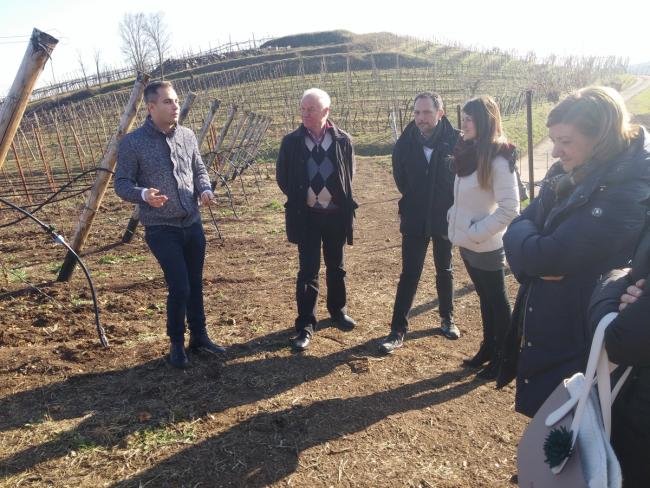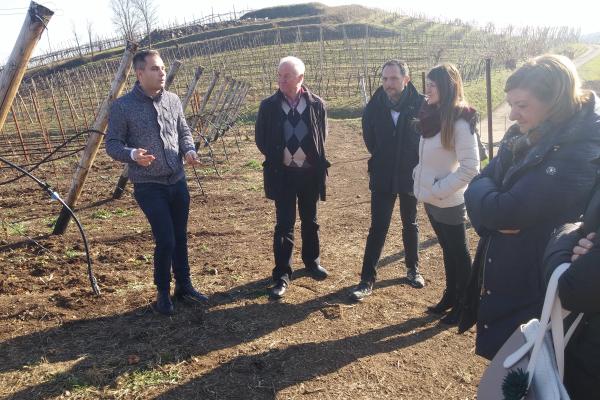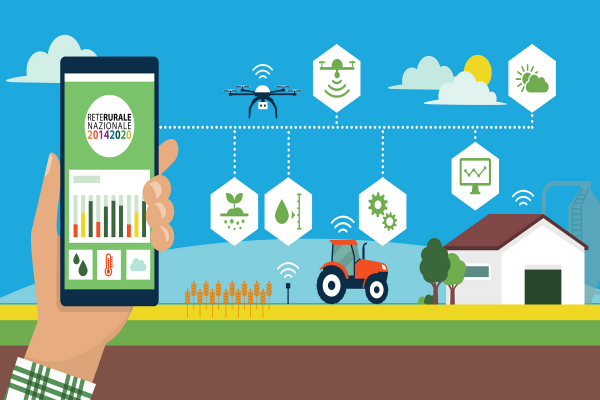Control of grapevine fanleaf and nematodes: cooperation to improve competitiveness of highly traditional areas

The main objective of the PAGO is to find out solutions aimed to improve quality and quantity of grape and wine production in vineyards infected by fanleaf and nematodes, transforming knowledge in economic value.
The specific objectives are: find out products able to reduce nematodes and improve plant health in experimental conditions, evaluate the effectiveness of field treatments in improving vine productions, assess the economic advantages, disseminate knowledge and results to stakeholders, educated grapegrowers to control fanleaf and nematodes.
The PAGO is organized into seven Working Packages (WPs), as follows:
- WP1: management and coordination of the project
- WP2: preliminary studies and pest monitoring (disease and nematodes)
- WP3: experimental trials in controlled conditions, for product and biological control agent evaluation
- WP4: experimental trials in vineyard with evaluation of the effectiveness of the tested products in improving quality and quantity of grapevine productions
- WP5: economic analyses at farm level
- WP6: dissemination and communication activities
- WP 7: training courses for grapegrowers
Grapegrowing is one of the major economical drivers in the Veneto region, especially in the last 10 years. The most traditional areas, where grapevine has been cultivated since centuries, represent a reference point for the regional viticulture. In such a terroirs, where vineyard plantation has been continuous, lead to the settlement of endemic diseases of grapevine, such as the fanleaf disease. This disease causes loss of production, both in quality and quantity, malformation of the plant organs and slow decline. It is caused by a virus called Grapevine Fanleaf Virus (GFLV), and it is field transmitted by the nematode Xiphinema index, widespread in soils traditionally cultivated with grapevine. In the last century the use of strong soil fumigants was admitted, but nowadays they are banished due to their toxicity, and new products are not enough effective. From the other side, crop rotation, very useful in controlling nematodes, is not use anymore in grapegrowing, due to economic reasons. Thus, in the last years the virus and its vector started to spread again, and became an emergent problem in all the traditional areas of grapevine cultivation, in all Europe. Therefore, there is the need to find out some solutions to control the disease, as at the moment they do not exist.
The proposed project allows the increase of production and competitiveness of grape growing farms where fanleaf disease and nematodes cause damages. In the project new experimental control strategies against the disease and the vectors are tried in the field and proposed to the farms. The use of natural products will allow producing wine in harmony with the natural resources of the areas with long tradition in grape cultivation. The use of these strategies will decrease the damages caused by the disease and its vectors, will increase the quality and quantity of gape and wine production, will improve the health of vineyards, will reduce the grapevine decline, and will enhance the competitiveness of SMEs. The proposed solutions include eco-friendly and sustainable control agents, such as defence elicitors, natural extracts, micro-organisms beneficial to the soil, which from the one hand will avoid the pollution, from the other hand will improve soil and vineyard balance in the areas where grapevine has been cultivated for centuries. The structure of the project, that join together top grape and wine farms, economic professionals, research centres expert in the issues of the PAGO, one of the biggest and qualified consortium of grape and wine farms, and two centres for territorial education, allows to broaden the advantages of the innovation to the viticulture micro and macro enterprises, first in Veneto and then in Italy and in Europe.
| Titolo/Descrizione | Url | Tipologia |
|---|---|---|
|
CECAT
|
Sito web
|
|
|
CREA Viticulture and Enology
|
Link ad altri siti che ospitano informazioni del progetto
|
|
|
INAMA Azienda Agricola
|
Link ad altri siti che ospitano informazioni del progetto
|
|
|
Le Colture Azienda Agricola
|
Link ad altri siti che ospitano informazioni del progetto
|
|
|
Università di Napoli, Dipartimento di Agraria
|
Link ad altri siti che ospitano informazioni del progetto
|
|
|
Collis-Veneto Wine Group
|
Link ad altri siti che ospitano informazioni del progetto
|
|
|
Agridinamica
|
Link ad altri siti che ospitano informazioni del progetto
|
|
|
Multimedia Formazione
|
Link ad altri siti che ospitano informazioni del progetto
|
|
|
Sito web del progetto
|
Sito web
|
|
|
Video #CREABREAK for # 2020: the #DIVINE project by #ViticolturaEnologia
|
Link ad altri siti che ospitano informazioni del progetto
|
|
|
Video Conference Project - Defense against infectious degeneration of the vine and nematoids
|
Link ad altri siti che ospitano informazioni del progetto
|
|
|
Video DI.VI.NE, a project to protect the best of Venetian viticulture from parasites
|
Link ad altri siti che ospitano informazioni del progetto
|
|
|
GLFV - A manual to know and recognize the Chardonnay variety
|
Materiali utili
|
|
|
Webinar VITE 10/03/2023 - Sustainable management of infections in vineyard - CONDIFESA Lombardy North-East
|
Materiali utili
|
|
|
Pagina Facebook
|
Link ad altri siti che ospitano informazioni del progetto
|


